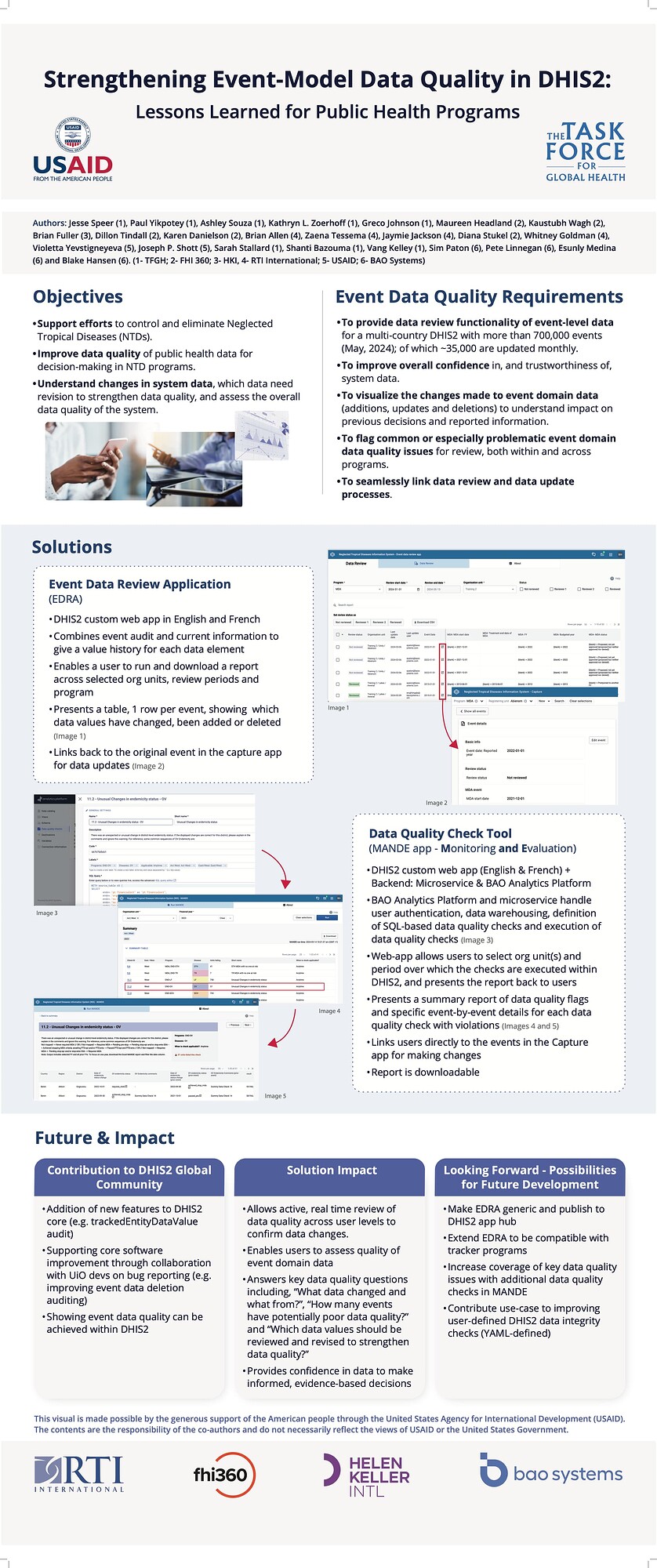This abstract has been accepted at the 2024 DHIS2 Annual Conference
Strengthening Event-Model Data Quality in DHIS2: Lessons Learned for Public Health Programs
Background: A necessary component to appropriate, evidence based decision making is access to high quality data. Core DHIS2 lacked review functionality for event data domain necessary for a multi-country system developed for neglected tropical disease (NTD) data management and use, in which more than 2.5 million data values across nearly 700,000 events are currently reviewed, updated and analyzed for decision making. Methods: In order to facilitate data review and quality processes in an NTD DHIS2 system that is primarily using event data, we engaged in a robust consultative process across developers, end users, and data scientists to develop two custom applications: an application to review event data (Event Data Review Application [EDRA]), and an application that utilizes an event domain data validation tool (“Monitoring and Evaluation [MANDE]”). Outcomes: This session will describe the custom applications and accompanying processes that were developed to address the programmatic need of facilitating high quality event data. The presenter will outline the programmatic requirements and how the two applications meet those needs: EDRA to combine audit and current information to give a value history for each data element, and enables a user to run a report across selected program, org units and periods which displays which data values have changed, been added or deleted. The app allows for active, real time review of data quality across user levels to confirm changes are accurate, and autoupdates the “Event Status” to ensure that only data that have been reviewed are populated in Analytics. MANDE allows users at multiple levels to run predefined data quality checks, to flag common or especially problematic data quality issues. The checks summarize the number of events “failing”, and link users directly to the event in the Capture app to make changes. Users may also download a copy of both EDRA and MANDE outputs in Excel. The EDRA and MANDE apps enable those who enter data and those who review data the ability to answer key questions to assess quality of event model data, including “What data changed?”, “What did it change from?”, “How many events have potentially poor data quality?” and “Which data values should be reviewed and revised to strengthen data quality?” By providing mechanisms for reviewing data changes at the individual event level and summarizing data quality issues, users of the NTD DHIS2 system will have confidence in appropriately using the data to make informed, evidence-based decisions.
Primary Author: Blake Hansen
Keywords:
Data quality, Neglected tropical diseases, NTDs, Custom applications, Event data
Here is the associated poster. Cannot wait to present at this year’s conference!
Final NIS Poster for DHIS2 Annual Conference 2024_v4.pdf (8.3 MB)
Strengthening Event-Model Data Quality in DHIS2: Lessons Learned for Public Health Programs
Background: A necessary component to appropriate, evidence based decision making is access to high quality data. Core DHIS2 lacked review functionality for event data domain necessary for a multi-country system developed for neglected tropical disease (NTD) data management and use, in which more than 2.5 million data values across nearly 700,000 events are currently reviewed, updated and analyzed for decision making. Methods: In order to facilitate data review and quality processes in an NTD DHIS2 system that is primarily using event data, we engaged in a robust consultative process across developers, end users, and data scientists to develop two custom applications: an application to review event data (Event Data Review Application [EDRA]), and an application that utilizes an event domain data validation tool (“Monitoring and Evaluation [MANDE]”). Outcomes: This session will describe the custom applications and accompanying processes that were developed to address the programmatic need of facilitating high quality event data. The presenter will outline the programmatic requirements and how the two applications meet those needs: EDRA to combine audit and current information to give a value history for each data element, and enables a user to run a report across selected program, org units and periods which displays which data values have changed, been added or deleted. The app allows for active, real time review of data quality across user levels to confirm changes are accurate, and autoupdates the “Event Status” to ensure that only data that have been reviewed are populated in Analytics. MANDE allows users at multiple levels to run predefined data quality checks, to flag common or especially problematic data quality issues. The checks summarize the number of events “failing”, and link users directly to the event in the Capture app to make changes. Users may also download a copy of both EDRA and MANDE outputs in Excel. The EDRA and MANDE apps enable those who enter data and those who review data the ability to answer key questions to assess quality of event model data, including “What data changed?”, “What did it change from?”, “How many events have potentially poor data quality?” and “Which data values should be reviewed and revised to strengthen data quality?” By providing mechanisms for reviewing data changes at the individual event level and summarizing data quality issues, users of the NTD DHIS2 system will have confidence in appropriately using the data to make informed, evidence-based decisions.
Presenters: Paul Yikpotey, Jesse Speer (Task Force for Global Health) and Blake Hansen (BAO Systems)
